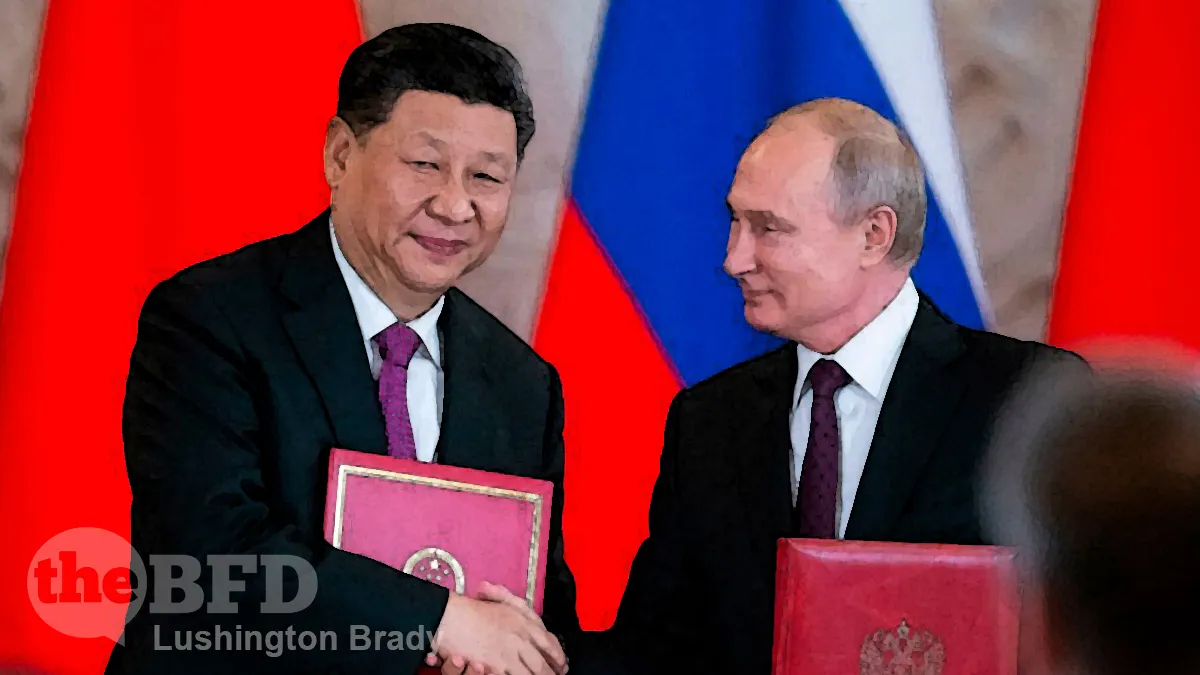Table of Contents
Well, the Masters of War have wound up their propaganda machine and set it barrelling on, hooting and clanging, all fired up to lure us into one of those foreign wars they missed so much under the Bad Orange Man. “WWIII! The New Hitler! Taking over the world!”
You know the script: they dust it off, every few years. Most of you will be old enough to remember when they said the same about Saddam Hussein, if not Ho Chi Minh. Neither of them nice guys, sure, but not exactly the world-devouring imminent threats the military-industrial-media complex fooled so many people into believing.
Which brings us to Vladimir Putin and the Ukraine. Again, Putin is nobody’s idea of a democratic saint (but then, neither’s Justin Trudeau: the sight of Moosealini lecturing Putin about “authoritarianism” is yet another Clown World absurdity of our times), but is he really the bogey-man the War Machine wants us to believe?
More importantly, is his chumminess with Xi Xinping some kind of Axis alliance of the 21st century?
Journalist Rowan Callick, a long-time Beijing correspondent, is no fan of Xi or Communist China (a “pervasive and sometimes cruel rule”, “one of scrupulous uniformity, of intolerance of autonomous thought or expression”). But he’s not quite convinced that Putin and Xi are the Hitler and Hirohito of our times.
Beijing would be seriously conflicted by a military attack patently launched by Russia.
While on the one hand, Xi and Putin are closer than any Russian and Chinese leaders since the 50s, it should also be remembered that while Mao pretended to be admiringly subservient to Stalin while it suited him, the two leaders privately detested one another. Despite being fellow communists, the Soviet Union and Maoist China were hardly the greatest friends.
Not a lot has really changed in that respect. More importantly, Xi is playing a double-game that would rapidly come unravelled by all-out aggression from Russia.
First, there is where they publicly see eye-to-eye.
He and Xi signed a 5000-word joint statement that comprised a manifesto for pursuing energetically a new international order championing their authoritarian inclinations, including insisting that “the advocacy of democracy and human rights must not be used to put pressure on other countries”, and aligning Putin’s Greater Eurasian Partnership with Xi’s Belt and Road Initiative.
The leaders both seek legitimacy strongly through bursting the claimed chains of past national victimhood, and leading their countries into rejuvenated uplands of international respect.
But there is also the fact that China, however hypocritically, upholds as one of its core principles the sanctity of sovereignty and its staunch opposition to interference in other countries’ domestic affairs”. Respecting sovereignty is one of the founding myths of Communist China: which sought legitimacy by throwing off the yoke of the “century of humiliation” when China was run by foreign powers. More practically, “respecting sovereignty” allows China to rebuff international criticism of its appalling treatment of many of its citizens.
Thus Foreign Minister Wang Yi told the Munich Security Conference last weekend: “The sovereignty, independence and territorial integrity of any country should be respected and safeguarded. Ukraine is no exception.”
The Ukraine embassy in Beijing posted a Chinese language statement on the domestic platform Weibo – which readily censors material perceived as injurious by the authorities – accusing Russia of “seriously violating the basic principles of international law”. It has gained 300 million views.
In the past, Beijing has abstained rather than back Moscow in associated UN votes, and has not recognised Moscow’s annexation of the Crimean peninsula in 2014.
A further complicating factor for Beijing is that China bought its first aircraft carrier from Ukraine back in 1998, now renovated and leading the burgeoning Chinese naval fleet as the Liaoning.
The Australian
So, is Xi likely to be a restraining influence on Putin? That’s probably stretching it, but the War Machine propaganda painting the two as in cahoots to take over the world is also stretching alarmism.
Xi would benefit from a US-led West that’s overly distracted by a skirmish in the old USSR, but China also still needs the West, especially economically.
So, it seems that the main thing for the rest of us is to keep the hooting alarmism of the War Machine’s propaganda arm in perspective, and not get fooled again.








